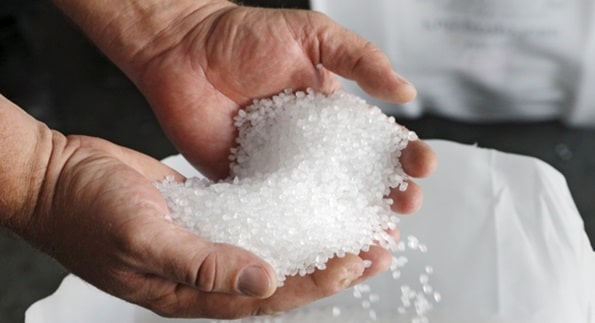Lukoil capacity polyethylene polypropylene - Arhive
Lukoil plans to increase capacity for polyethylene and polypropylene Lukoil capacity polyethylene polypropylene

MOSCOW – Lukoil, the second largest Russian oil company, will introduce a new gas strategy by the fall, including projects for the processing of raw materials, the vice president of the company for oil refining, petrochemistry and gas processing Rustem Gimaletdinov said, Kommersant writes.
According to him, oil and gas chemistry will become a “new growth point” for the company.
“We have a large amount of very high-quality raw materials for the production of both polyethylene and polypropylene through classical petrochemistry through pyrolysis,” he explained.
A top manager recalled that Lukoil, the first in the Russian Federation to launch a large-scale refinery modernization program, is going to complete its operation in 2021 with its introduction of a delayed coking unit in Nizhny Novgorod worth 100 billion rubles.
After that, Lukoil, which received a record cash flow in 2010 (555.1 billion rubles) and almost seven times reduced net debt (to 42 billion rubles), has virtually nowhere to invest in Russia.
In the production sector, all prospective oil fields on land are already distributed, and the company has no access to the shelf.Lukoil capacity polyethylene polypropylene
As Mr. Gimaletdinov noted, Lukoil does not see “further expansion in classic fuels”, expecting a decrease in demand for diesel fuel in Europe against the background of toughening environmental standards in the region, which imply a failure in the future from internal combustion engines.
At the same time, LUKOIL expects that the demand for diesel fuel will support a worldwide ban on the use of marine fuel with a sulfur content above 0.5%.
It should lead to a reduction in the use of fuel oil in bunkering in favor of diesel fuel.
In this regard, Lukoil is considering the construction of capacities for 1 million tons of polyethylene and 500 thousand tons of polypropylene, the demand for which is growing “many times faster than the growth of GDP (the forecast for 2019 is 1.3% in the Russian Federation).” Lukoil capacity polyethylene polypropylene
Previously, the site for the project was called the Nizhny Novgorod Oil Refinery Company in Kstovo.
But now, as Mr. Gimaletdinov noted, “Perm is in the lead by all indicators”, where there is a large amount of “correct” raw materials – ethane, liquefied hydrocarbon gases and light naphtha.
He did not specify the construction period, noting that according to experience, Five to six years since the final investment decision.
At the same time, he noted that the company is not ready to accept it this year. Now Lukoil produces in Russia about 120 thousand tons of polypropylene at the Stavrolen plant in Budyonnovsk, another 80 thousand tons release structure of Lukoil.
“LUKOIL Neftohim Burgas” in Bulgaria.
The capacity of both enterprises is expected to be expanded in the next five years.
In addition, Lukoil needs to monetize actively growing gas production (in the first quarter – by 12%, to 9 billion cubic meters).
One of the ways to process gas, in particular, from the Caspian fields to Lukoil, can be the construction of a complex for the production of 1.7 million tons of urea and 170 thousand tons of ammonia at Stavrolen, as well as the organization of the separation and processing of ethane. 2023 is considered as a possible launch date.
In addition, according to Rustem Gimaletdinov, the company is ready to consider participating in gas processing projects in the north-west of the Russian Federation, but only in partnership with someone. We can talk about projects for the production of methanol and gas chemical projects.Lukoil capacity polyethylene polypropylene
According to the newspaper, the company considered a project to build methanol production in Vysotsk with a capacity of 1.7 million tons based on a terminal for transshipment of petroleum products.
Dmitry Akishin, head of Gas and Chemistry, VYGON Consulting, agrees that the growth in demand for gasoline is severely limited, so it is logical to reorient your refineries to produce petrochemicals, whose market is growing by 3-5% per year.
The marginality of petrochemistry is significantly higher than in processing; it reaches 30–50%, the expert says.
In addition, propylene is a by-product of refining at the refinery, therefore, it has a low cost.
Therefore, the integration of oil refineries and petrochemical complexes is a strategically correct decision, says Mr. Akishin.
In his opinion, the markets for the majority of large-tonnage petrochemical products in the Russian Federation are practically balanced, so the new production will be focused on export. This is confirmed in LUKOIL itself.
The expert emphasizes that petrochemical projects are very capital-intensive – from 0.5–1 billion dollars for processing capacities for propylene and up to USD5–7 billion for full-fledged petrochemical complexes with pyrolysis.
Earlier it was reported that Lukoil, which owns the largest oil refinery in the Balkans, plans to build a petrochemical complex for the production of polypropylene (PP) on its basis.
Lukoil is one of the leading vertically integrated oil companies in Russia. The main activities of the company include exploration and production of oil and gas, production and sale of petroleum products.
Lukoil is the second largest privately-owned oil company in the world in terms of proven hydrocarbon reserves. Lukoil capacity polyethylene polypropylene
The structure of Lukoil includes one of the largest petrochemical enterprises in Russia – Stavrolen.
Earlier, the company also included Karpatneftekhim, the largest producer of polymers in Ukraine, but in February 2017, Lukoil completed the sale of this asset.
mrcplast.ru
Author: Anna Larionova
